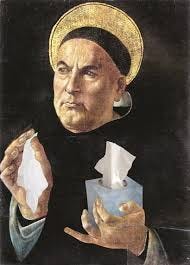In this episode, I begin to cover some foundational ideas in Roman Catholic Social theory. Is Roman Catholicism conservative? Does it promote life, liberty, and the pursuit of happiness?
Listen and find out!
—h.
Notes
Frederick Copleston’s History of Philosophy Vol. II: Mediaeval Philosophy, Pt. II: Albert the Great to Duns Scotus.
Examining The Rise and Triumph of the Modern Self — Pt. 1 {The remaining six articles in the series are interlinked.}
Ecclesiastical Megalomania: The Economic and Political Thought of the Roman Catholic Church
A better explanation of the “Donum Super Additum” —
Donum Superadditum, Or Supernaturalè a designation of the scholastic doctrine of "superadded grace" given to Adam, in addition to his natural powers, and which grace he lost by the Fall. According to some of the scholastic divines (Scotus Erigena, Bonaventura, etc.), original righteousness (justitia originalis) was added to man's natural powers (pura naturalia) as a donum superadditum. Aquinas held (part 1, qu. 95. art. 9) that man was created in possession of original righteousness, still, however, as a grace superadded to his natural powers. Mohler thus states the doctrine: "No finite body can exist in a living moral communion with the deity save by the communion of the Holy Spirit. This relation of Adam to God, as it exalted him above human nature, and made him participate in that of God, is hence termed a supernatural gift of grace, superadded to the endowments of nature. This is not merely a private opinion of theologians, but a dogma" (Symbolism, book 1, part 1, § 1, N.Y. 1844, 8vo; see also the Catechismus Romanus, 1:2, 19; Bellarmin, Gratia primi hominis, 2; citations in Winer, Comparat. Darstellung, 4). Dr. J.H. Newman, while yet in the Church of England, taught this doctrine: "What Adam lost in sinning was a supernatural endowment" (Lectures on Justification, 177); so also archdeacon Wilberforce: "The likeness of God must have been some divine presence superadded to primitive nature (On Incarnation, page 71, London edit.). The Roman Church further holds that this supernatural presence is restored by baptism, so that a baptized person stands in the condition of Adam before the Fall. If he goes astray, he is to be restored by confession, absolution, and the sacrament of penance. See Bird, Sacramental System (London, 1854), § 4; Hagenbach, History of Doctrines (Smith's edit.), § 175, 245; Jackson, Works, 9:8 (Oxford); Neander, History of Dogmas (Bohn's edit.), 2:654.
[Source]














Share this post